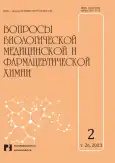Состав и физико-химические свойства белков околоплодных вод при осложненной беременности
- Авторы: Погорелова Т.Н.1, Никашина А.А.1, Гунько В.О.1, Крукиер И.И.1, Левкович М.А.1, Палиева Н.В.1, Михельсон А.А.1
-
Учреждения:
- ФГБОУ ВО «Ростовский государственный медицинский университет» Минздрава России
- Выпуск: Том 26, № 2 (2023)
- Страницы: 37-41
- Раздел: Биологическая химия
- URL: https://journals.eco-vector.com/1560-9596/article/view/248487
- DOI: https://doi.org/10.29296/25877313-2023-02-06
- ID: 248487
Цитировать
Полный текст
Аннотация
Актуальность. Физиологическое течение пренатального онтогенеза во многом зависит от состояния околоплодных вод, в значительной степени обеспечивающих организм плода необходимыми для его развития веществами. В числе осложнений беременности к особенно тяжелым последствиям приводят преждевременные роды. В связи с этим выяснение механизмов развязывания родовой деятельности до срока имеет важное значение. Наиболее информативными для достижения данных целей являются белки, выполняющие многочисленные функции в регуляции клеточного метаболизма.
Цель работы – изучить состав и свойства белков околоплодных вод и значение их изменения в прогнозировании преждевременных родов.
Материал и методы. В исследование включены 29 здоровых женщин с неосложненной беременностью и родами в срок (контрольная группа) и 35 женщин, у которых в 34–37 недель развилась родовая деятельность (основная группа). В околоплодных водах, взятых в 16–18 недель (путем трансабдоминального амниоцентеза), определяли спектр белков и ряд их физико-химических свойств, используя методы электрофореза, хроматографии, спектрофотометрии и денситометрии.
Результаты. Установлено, что развитие преждевременной родовой деятельности происходит на фоне модификации белок-белковых взаимодействий и комплексования белков с небелковыми соединениями.
Выводы. Выявленный дисбаланс белкового состава может быть важным звеном в цепи функционально-молекулярных нарушений, приводящих к преждевременным родам.
Ключевые слова
Полный текст
Об авторах
Т. Н. Погорелова
ФГБОУ ВО «Ростовский государственный медицинский университет» Минздрава России
Автор, ответственный за переписку.
Email: tatiana.biochem@yandex.ru
д.б.н., профессор
Россия, Ростов-на-ДонуА. А. Никашина
ФГБОУ ВО «Ростовский государственный медицинский университет» Минздрава России
Email: tatiana.biochem@yandex.ru
к.б.н., науч. сотрудник
Россия, Ростов-на-ДонуВ. О. Гунько
ФГБОУ ВО «Ростовский государственный медицинский университет» Минздрава России
Email: tatiana.biochem@yandex.ru
к.б.н., ст. науч. сотрудник
Россия, Ростов-на-ДонуИ. И. Крукиер
ФГБОУ ВО «Ростовский государственный медицинский университет» Минздрава России
Email: tatiana.biochem@yandex.ru
д.б.н.
Россия, Ростов-на-ДонуМ. А. Левкович
ФГБОУ ВО «Ростовский государственный медицинский университет» Минздрава России
Email: tatiana.biochem@yandex.ru
д.м.н., доцент
Россия, Ростов-на-ДонуН. В. Палиева
ФГБОУ ВО «Ростовский государственный медицинский университет» Минздрава России
Email: tatiana.biochem@yandex.ru
д.м.н.
Россия, Ростов-на-ДонуА. А. Михельсон
ФГБОУ ВО «Ростовский государственный медицинский университет» Минздрава России
Email: tatiana.biochem@yandex.ru
к.м.н.
Россия, Ростов-на-ДонуСписок литературы
- Palmas F., Fattuoni C., Noto A. et al. The choice of amniotic fluid in metabolomics for the monitoring of fetus health. Expert Rev. Mol.Diagn. 2016; 16(4): 473–486.
- Савельева Г.М., Курцер М.А., Панина О.Б. и др. Прегравидарная подготовка в профилактике преждевременных родов. Вопросы гинекологии, акушерства и перинатологии. 2017; 16(6): 24–29.
- Белоцерковцева Л.Д., Коваленко Л.В., Иванников С.Е. Преждевременные роды. Кому помогут токолитики? Вопросы гинекологии, акушерства и перинатологии. 2017; 16(2): 12–16.
- Погорелова Т.Н., Гунько В.О., Никашина А.А. и др. Изменение состава сложных белков в субклеточных фракциях синцитиотрофобласта при плацентарной недостаточности. Вопросы биологической, медицинской и фармацевтической химии. 2021; 24(1): 38–42.
- Brosens I., Pijnenborg R., Vercruysse L., Romero R. The «Great Obstetrical Syndromes» are associated with disorders of deep placentation. Review. Am. J. Obstet. Gynecol. 2011; 204(3): 193–201.
- Ковалев В.В., Кудрявцева Е.В., Миляева Н.М., Беломестнов С.Р. Большие акушерские синдромы: «гордиев узел» генных сетей. Уральский медицинский журнал. 2018; 13(168): 40–47.
- Linder M.C. Ceruloplasmin and other copper binding components of blood plasma and their functions: an update. Metallomics. 2016; 8(9): 887–905.
- Погорелова Т.Н., Гунько В.О., Никашина А.А. и др. Нарушение баланса свободных металлов и металлсодержащих белков в околоплодных водах при плацентарной недостаточности. Клиническая лабораторная диагностика. 2021; 66(5): 266–270.
- Loukovaara M., Koistinen R., Kalme T. et al. Serum insulin-like growth factor-I and insulin-like growth factor binding protein-3 in premature rupture of membranes. Acta Obstet. Gynecol. Scand. 2002; 81(10): 905–908.
- Орлов В.И., Погорелова Т.Н., Крукиер И.И. и др. Околоплодные воды. Химический состав и биологические функции. РнД.: Эверест. 2009; 224 с.
- Погорелова Т.Н., Гунько В.О., Никашина А.А. и др. Протеиногенные аминокислоты околоплодных вод и их роль в качестве инициаторов преждевременных родов. Вопросы гинекологии, акушерства и перинатологии. 2019; 2: 101–106.
- Than G.N., Bohn H., Szabó D.G. Advances in Pregnancy-Related Protein Research: Functional and Clinical Application. CRC Press. 2020. 352 p.
Дополнительные файлы






